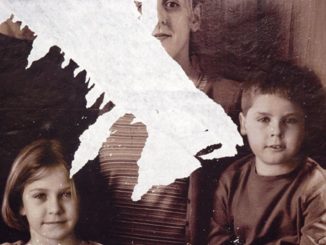
Andrew Newton – Licence CC BY-SA 2.0
There is a very old adage, one that has been proven wise and considered throughout the ages. It is “Honesty is the best policy”. While many will view this rule of thumb as a loose guideline in our more shallow interactions with our fellow men and women, few will dare examine the impact of such wisdom in light of our internal narratives, or in the quest for deeper relationship be they with ourselves, others, or indeed God. The aphorism, “Most men live lives of quiet desperation”, quoted by Henry David Thoreau, immediately springs to mind here. To survive the rigours of this world we must be guarded not only in our thoughts and actions, but create an artificial “mask” we wear at all times, be it in the presence of strangers or indeed our most intimate of fellow travellers, friends, lovers or family. This ritual, which we undertake with a pathological ruthlessness, is so ingrained in our society, that any individual who dares tear away at this shallow edifice from within is automatically considered strange or weird. Conversely, external entities that attempt such an affront to human dignity are considered immoral, evil, manipulative, and with very good reason. The destruction of this barrier is frequently the hallmark of the cult, and is a reliable signature that as an individual you will not only lose any personal autonomy, but are going to be an unwilling partaker in your own brainwashing. Such methods are frequent tools used in “senior management courses”, the ultimate goal being to disassemble the individual and reform them into some form of group “clone”, that closer matches the ideals of the perpetrator. There are many different techniques used to achieve the same ends, from the psychological to the physical, but the end results are the same. By manipulating and silencing the crying child inside, we gain admittance to an adult world at the cost of individual identity, humanity, but most disturbingly, the quenching of that internal truth that says “I hurt”. Not infrequently, unless you are a particularly strong character, such abuse ends in serious mental or physical health issues, or indeed suicide.
I am not talking here about the faux emotionalism that seems to have overtaken our society in a bloated, fetid cloud of social justice, political correctness, and sanitised expression that refuses to accept the fact that all humans are capable of the most unspeakable evils. Rather, I am addressing the unspoken pain that many silently carry, not sharing their grief for fear of ridicule or condemnation. I saw it with both my parents, although my mother was much more open in sharing circumstances that many would consider highly inappropriate for a young adult. Far from messing me up, it gave me an unending respect for my adopted mother, and a real bee in my bonnet about the importance of honesty and “keeping things real” in relationships. By telling me her darkest secrets, I could understand why she was so vulnerable. Conversely, my father never showed any real vulnerability, even to my mother, and as a result, he remains an unknown quantity. Having walked that path myself for many years, I can attest to the most appalling loneliness that such “strength of silence” offers the individual, only to be partially relieved by intoxicants, and fully by the confessional. For all have sinned, and be it with a physical or spiritual priest we engage, the need for understanding, acceptance and forgiveness is universal.
The question is not one of “Is man inherently good or bad” ? If we are honest with ourselves, we will be the first to admit that “There by the grace of God go I”, and it is only by some amazing alignment of circumstances beyond our control, that we have not fallen foul of such circumstances that would result in us falling into a hellish cycle of self deception and opportunity, that inevitably results in such monsters as Hitler, Stalin, or Pol Pot or the neighbourhood psychopath. Scream as we might to the contrary, there is no human born naturally to date, that finds the execution of good easier, less onerous, and least rewarding in the short term than prosecution of evil and short-term gain. As any parent will testify, you do not need to teach your children how to be bad. Undisciplined, uneducated, uninformed and unwilling, left to their own devices, these “natural” children will grow to be enchanting rebels, skilled in manipulation and sophistry, yet unable to appreciate the the great personal cost that selling their souls for personal advancement entails. Ruling in Hell rather than serving in Heaven, such individuals do not understand the apparent folly of self-sacrifice, nor the concepts of individual self awareness, humility or forgiveness. To the lesser or greater degree, you have a character formed of great deceit, one whose apparent outward charisma and empathy are well crafted to disguise a dark, selfish and bitter soul.
This faux emotionalism, the artificial alternative to empathy or compassion born of genuine grief, is always easily exposed with a bit of digging beneath the surface. Transient, shallow, self seeking and promoting, it pretends to offer succour and relief, but in reality is a band-aid on a wound that frequently requires disinfection, stitches and potentially skin grafts. The relentless pressure of the stiff upper lip, while clothing the patient in a modicum of self respect, ultimately results in a false pride and injury elsewhere. There is a world of difference between stoically accepting something, with a level of grace, humility and understanding your place in the universe, and gritting your teeth, denying the reality of circumstance. Like the sanitised echo chambers of the politically neutered, the only sound that is heard is the baying of victimhood, as to whom has been damaged the most. By embracing and encouraging such vocal martyrdom, they are akin to the Black Knight in the Monty Python sketch, and despite the clear mortal injuries, protest that theirs is but a minor flesh wound. While attracting the attention of many a Good Samaritan, from afar, there appears a symbiotic relationship between the “victim” and their “rescuer”. Watching this macabre dance of plastic compassion, one comes to realise that both need, and indeed deserve, each other. When faced with real need, the rescuer can offer little than empty platitudes. The victim, if they are to accept such shallow assistance, are condemned to remaining the victim. For in reality, such relationships are often based on interdependence – rather than restoration – for both parties. Give a man a fish, and you feed him for a day. Teach a man to fish, and you feed him for life.
Once again, if we are honest, we are all broken to some degree or another. Each has their individual cross to bear, but nothing is more repugnant than the elevation of such burdens to the tasteless alter of public promotion, social status and celebrity. The incessant exposure of charitable cases from the high street to television screen, newspaper column and radio speaker, are a constant reminder of our blessings and the ever hungry maws of those that wish to relieve us of such, by incessantly pulling at our gullible heart strings. There is a phrase for it, compassion fatigue, and we have consumed the gratuitous promotion of suffering to the extent that we are close to immune to the suffering of our closest neighbour. Is it any surprise the rise in anti-depressant use, alcohol abuse and mental health problems that have accompanied the collapse of relationships and family? With all the insincerity that enshrouds our society, why do we wonder when consumerism and celebrity have replaced God? The reason is simple, the solution complex. As a society, as a nation, we have forgotten how to trust. We are so obsessed with keeping our respective masks in place, we have forgotten how to relate to the mess of humanity beneath, warts and all. We are embarrassed when the fragile mask is shattered with illness, divorce, bankruptcy, bereavement. One party desperately trying to keep the mask in place to hide their shame, the other desperately trying not to acknowledge that they, too, have feet of clay. Unless we are fortunate enough to have someone in our vicinity who unconditionally understands and accepts us, it is a tall order to expect anything but a temporary restraint of suffering under such circumstance. A wise man once said if you can count your true friends on one hand, you are fortunate. I would add, receiving the unconditional love of another is an immeasurable blessing, and is an essential part of healing if we are to come to terms with our weaknesses, our failures, our brokenness. It also demands a brutal honesty, courage and vulnerability from both parties, and the willingness to accept we do not have all the answers. Anything but the confectioned church of modern media, where victimhood is worn as a badge of pride, your peers are your priest, and popularity your judge.
The solution? I cannot speak for you, but for me. The first step is honesty with yourself. This is probably the most difficult part. I find the best way of executing this is through writing, I find it cathartic but it also gives me a freedom to play with concepts and my emotions that reality doesn’t permit me. What you write doesn’t have to be for public consumption, leave it for your heirs or burn it. Just don’t regret you have expressed it. Better out than in. Secondly, find someone you trust and confide in them. Share your deepest fears. Often, they are just false spectres. If there is nobody you can trust, remember there is a God, and if you have enough courage, pray. If you don’t have the courage, pray you get some.
And this leaves me with a major quandary. Having encountered evil in my life on a scale most readers of this piece can only imagine, do I share my experiences with a view to encouraging others who don’t have the courage to speak, that they are not alone? Or do I keep schtum? Be it physical or emotional pain, such questions are important. For me, I have passed the tipping point, for I know the time is short. Soon no doubt, I will be doing the death clean as so eloquently illustrated by Barbican in their recent article, and for the same reasons.
© Rookwood 2020
The Goodnight Vienna Audio file
Audio Player



